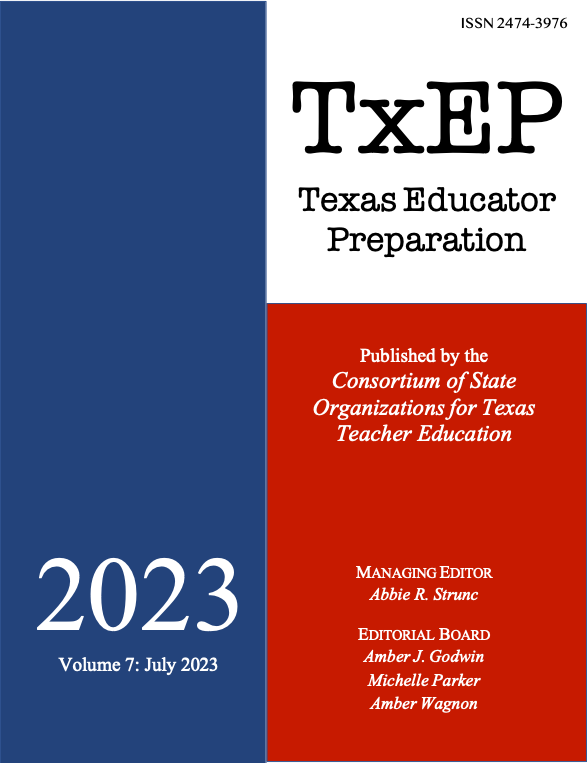Uniting a Community: The School and University Partnership Conference on Education
DOI:
https://doi.org/10.59719/txep.v7i1.5Abstract
The College of Education and Human Development at Texas A&M University – Corpus Christi hosts an annual School and University Partnership Conference of Education (SUPCE), where teachers, future teachers, school leaders, community members, university faculty, and the business community focus on educational challenges, learning opportunities, community engagement, and professional development. The 2022 conference theme focused on the #heartwork of recruiting and retaining teachers and included a powerful keynote speaker and sessions in areas such as the recruitment and retention of teachers, STEM, and digital learning. Based on positive feedback from participants on the importance and impact of the conference, the planning committee plans to continue it in 2023.
Downloads
References
Achinstein, B. (2002). Conflict amid community: The micropolitics of teacher collaboration. Teachers College Record, 104(3), 421-455.
Borg, S. (2015). The benefits of attending ELT Conferences. ELT Journal, 69(1), 35– 46. https://doi.org/10.1093/elt/ccu045
Center for Educator Recruitment, Retention, & Advancement. (2022). February 2022: Supply & demand update. https://www.cerra.org/uploads/1/7/6/8/17684955/february2022_supply_demand_update_ _1_.pdf
Clark Childers, K., & Perry, D. H. (2021). Scared fearless: An unlikely agent in the US Secret Service. Texas A&M University Press.
Darling-Hammond, L., Hyler, M. E., and Gardner, M. (2017). Effective teacher professional development. Learning Policy Institute.
Darling-Hammond, L., & McLaughlin, M. W. (1995). Policies that support professional development in an era of reform. Phi Delta Kappan, 76(8), 597-604.
DuFour, R. (2005). What is a professional learning community? In R. DuFour, R. Eaker, & R. DuFour (Eds.), On common ground (pp. 31–43). National Education Services.
Grote-Garcia, S., & Ortlieb, E. (2022). Trends and issues in literacy: A 25-year analysis of the what’s hot in literacy survey. ALER yearbook, 43, 81-101.
Knapp, M. S. (2003). Professional development as policy pathway. Review of Research in Education, 27(1), 109-157.
Motteram, G. (2016). Membership, belonging, and identity in the twenty-first century. ELT Journal, 70(2), 150–159. https://doi.org/10.1093/elt/ccw001
Nguyen, T. D., Lam, C. B., and Bruno, P. (2022). Is there a national teacher shortage? A systematic examination of reports of teacher shortages in the United States. (EdWorkingPaper: 22-631). Retrieved from Annenberg Institute at Brown University: https://doi.org/10.26300/76eq-hj32
Robert Noyce Teacher Scholarship Program. (2022). https://www.nsfnoyce.org/
Shannon L. N., Maeng, J. L., & Bell, R. L. (2019). Learning from a state professional development conference for science teachers: Beginning secondary science teachers’ experiences. Journal of Science Teacher Education, 30(4). 409– 428.https://doi.org/10.1080/1046560X.2019.1584512
Singleton, Glenn E. (2015). Courageous conversations about race : a field guide for achieving equity in schools. Corwin.
What is Grow Your Own? (2022). https://tea.texas.gov/texas-educators/educator-initiatives-and-performance/educator-initiatives/grow-your-ownst





